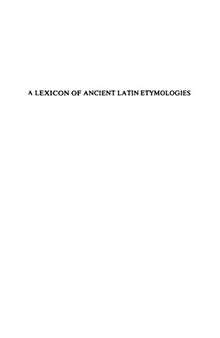 جزییات کتاب
جزییات کتاب
Etymology - the study of words especially with reference to their derivations - was an important element in ancient thought, starting with Plato's Cratylus. In the Roman period it became even more significant, in part because of the impact of Stoicism on the earlier development of Roman law. The De lingua latina of M. Terentius Varro, a contemporary of many of the major classical Latin writers, is a rich store of etymological theory and example. With the development of historical philology in the nineteenth century, ancient etymological practice came to seem unscientific and thus unworthy of serious attention. Classicists regarded as ridiculous such derivations as the well-known ''lucus a non lucendo'' (a 'shady grove', from 'not being lit'); obvious etymologies, mainly on proper names, they tended to dismiss as trivial wordplay, feeble punning, or mere ornamentation. But more recent scholarship has shown that etymologies in Latin and Greek poetry and prose range far beyond proper names, and are by no means always obvious. In an intellectual climate friendly to diverse linguistic structures, ancient etymologising is increasingly being used as a tool in the study of ancient literature, and the intellectual substructure of ancient etymological theory is once again being taken seriously. But the ancient sources for known etymologies are scattered and sometimes hard to consult, and the limits of the possible are not always respected by literary scholars. In A Lexicon of Ancient Latin Etymologies Robert Maltby provides an indispensable resource for this field of enquiry. He has assembled all the explicitly attested etymologies of Latin antiquity, from the predecessors of Varro to Isidore of Seville, covering glossaries and scholia as well as standard ancient etymological source-works. His policy of quoting extensively, rather than summarising, reveals the relationships between ancient authorities, and the reasoning behind many of their etymologies. The result is a major work of reference which will ease informed access to this area of ancient science.
 درباره نویسنده
درباره نویسنده

توماس رابرت مالتوس (به انگلیسی: Thomas Robert Malthus) (۱۴ فوریه ۱۷۶۶–۲۹ دسامبر ۱۸۳۴) استاد دانشگاه انگلیسی بود که تأثیر بسیار زیادی روی جمعیتشناسی و اقتصاد سیاسی گذاشتهاست مالتوس به خاطر پایهگذاری نظریه رانت مشهور است.
 دانلود کتاب
دانلود کتاب
 جزییات کتاب
جزییات کتاب
 درباره نویسنده
درباره نویسنده
 توماس رابرت مالتوس (به انگلیسی: Thomas Robert Malthus) (۱۴ فوریه ۱۷۶۶–۲۹ دسامبر ۱۸۳۴) استاد دانشگاه انگلیسی بود که تأثیر بسیار زیادی روی جمعیتشناسی و اقتصاد سیاسی گذاشتهاست مالتوس به خاطر پایهگذاری نظریه رانت مشهور است.
توماس رابرت مالتوس (به انگلیسی: Thomas Robert Malthus) (۱۴ فوریه ۱۷۶۶–۲۹ دسامبر ۱۸۳۴) استاد دانشگاه انگلیسی بود که تأثیر بسیار زیادی روی جمعیتشناسی و اقتصاد سیاسی گذاشتهاست مالتوس به خاطر پایهگذاری نظریه رانت مشهور است. 





 این کتاب رو مطالعه کردید؟ نظر شما چیست؟
این کتاب رو مطالعه کردید؟ نظر شما چیست؟
